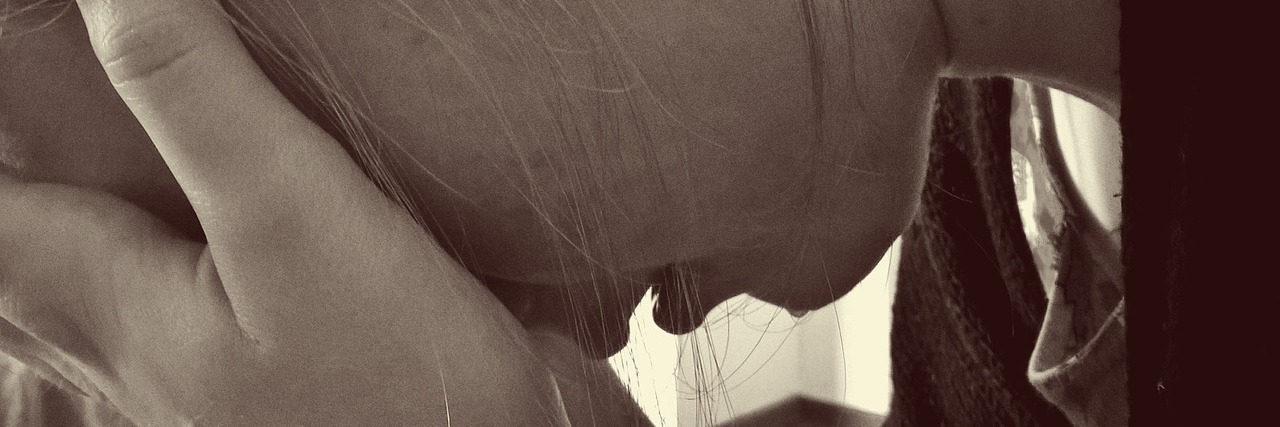The other night, in the middle of table conversation at a friend’s dinner, tears suddenly came streaming down my face. This is one of those friends you call sister. She, her husband and their kids are family to me and my two boys. They have walked alongside us on our 20-year journey of disability, divorce and determination. It was horribly awkward to be melting in the midst of love and laughter — but more troubling to discover that I’m much sadder than I’ve been willing to accept.
This was the first time in a very long time that I can remember losing myself to my sadness in the midst of a social gathering. I’ve always been known for my honed ability to ball right up to the doorway and, without a beat, wipe my eyes and all other signs of turmoil and despair away, appearing cheerfully with that go-get ‘em-glow face. The face many people expect to see no matter how many times they ask you, “how are you feeling? I mean really, how are you feeling?”
These friends are not that kind. When they ask how I am doing, they mean it. Over time they’ve proven they can take the difficult reply. They were there as I stumbled through raising a son with Down syndrome, crawled through a painful divorce, scaled the darkness of seizures and wept over the potential impact all of this might have on my older, incredibly amazing son, who they’d partially adopted as their own. They known me to shed a tear and bounce back, and to only let the tears out when it was just us.
Unlike past times, I was unable to contain the tears and it felt disturbingly out of character. The feeling was so strong that I was unable to swallow the emotion, breath in and pull it back, or make a joke to cover-up. It felt like the aura that comes before a seizure, you know it’s not going to end well, but there’s nothing you can do once it starts.
The next few days, I couldn’t escape the voice in my head asking, “what happened?” The question of what happened during dinner quickly became the larger question, “What happened to me and to my life?”
My life has been challenged, blessed, guided and re-directed by disability and illness, both mine and my sons. Nearly every aspect of what has happened has been influenced by the incidents, reactions and guardrails disability and illness have brought into my life. For example, seizure disorders demand you get your beauty sleep, Down Syndrome lights your heart and patience on fire and dealing with IEP teams prepares you to start a political career, become a kick-boxing instructor or invent an anti-aging product.
So, here is my hypothesis about the dinner. In that moment, the eruption was actually triggered by the warmth, kindness and concern in my friend’s husband’s eyes when he quietly leaned over, put his hand on mine and asked if I was OK. “You’re not your usual self,” he said. That simple, sincere gesture sent a jolt of love to my heart, the final emotional surge that blew the volcano. I’ve found having my life framed by the realizations that health is not a given, stigma is a reality and love trumps all, has enabled me to find joy and renewal in very simple things, like genuine expressions of kindness, humor and compassion.
What caused the build-up to this eruption? Simple. It was my lapse into the dangerous land of comparison, wanting and self-pity — a destination city on what I call my “Island of What Happened.”
As I sat listening to everyone sharing stories of where they’ve been and where they are going, I realized I had nothing to add. In that moment, I was seeing myself as a failure because I hadn’t created the life my friends had. I haven’t been to Costa Rica or Nashville lately, and I don’t see that happening soon. Their animated table conversation crossed paths with the chilling one inside my head, swirling into an ice storm, and then a white out.
It’s these times, when I see the real consequences of being a single mom of a child with a disability, my fight or flight response kicks in and I flee to my island. Here, I find a strange comfort and safety in knowing I am OK alone with no connection to the world of those who live on the mainland. It is here that I explore “what happened” and romp between the despair of having failed at everything and the joy of having conquered all of the challenges that have come my way.
What I’ve found is that I have choices on the filters I can use to reflect on what happened. The lighter, positive filters show me the gifts that disability and illness have brought into my life and remind me that there is always a trade-off, and any freedom or independence I’ve lost has been more than compensated for in love and laughter. The negative filters shift that light away from the love and laughter and onto others who have the things that I’ve lost or am unable to reach. The darker filter projects shadows of disappointment, regret and blame for not having done better. The lighter filter shines forgiveness and acceptance, and promises that possibility can live in a land of limited control and choice.
I know there will be another time when tears stream down my face and I land in that destination city on the “Island of What Happened.” There, I will again choose my light filter and it will show me that my blessings are as different and as glorious as my son’s abilities. And that will be the amazing journey I will share next time I’m feeling blue at a dinner party.
Image via Pixabay

